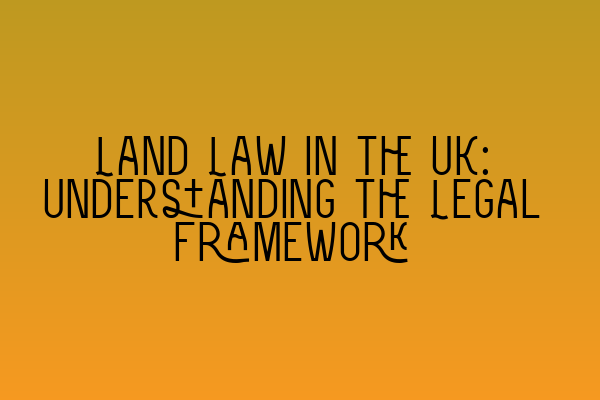Land Law in the UK: Understanding the Legal Framework
Land law is one of the key areas of legal expertise that governs the ownership, use, and transfer of land in the United Kingdom. Whether you are a property developer, homeowner, or investor, having a solid understanding of land law is crucial for navigating the complexities of property transactions and disputes. In this article, we will delve into the legal framework of land law in the UK, providing you with the knowledge you need to protect your interests and make informed decisions.
1. Introduction to Land Law
Land law encompasses a wide range of legal principles and rules that govern various aspects related to land ownership, usage, and rights. One of the fundamental principles of land law is that all land in the UK is subject to the doctrines of tenure and estates. Tenure refers to the legal concept that underpins all land ownership, establishing the relationship between landowners and the Crown. Estates, on the other hand, determine the rights and interests that an individual can possess in a particular piece of land.
Understanding the different types of estates is essential in land law. Freehold estates, for instance, grant the owner absolute rights of ownership and possession over the land. Leasehold estates, on the other hand, give the occupier the right to use and occupy the land for a fixed period, subject to certain conditions and limitations imposed by the landlord.
2. Transfer of Land
The transfer of land is a significant aspect of land law. When buying or selling land, it is important to ensure that the transfer is legally binding and properly documented. This is usually achieved through the use of contracts, such as the sales contract or the lease agreement, which contain all the necessary terms and conditions of the transaction.
It is important to note that certain transfers of land, such as those involving registered land, must be registered with the Land Registry. This ensures that the transfer is legally recognized, giving the new owner secure title to the land. Failure to register a transfer can result in potential disputes and complications in the future.
3. Rights and Restrictions
Land law also governs the rights and restrictions that apply to land ownership. These can include restrictive covenants, easements, and profit a prendre, among others.
Restrictive covenants are legally binding obligations placed on a property owner, restricting the use or development of the land in a certain way. Easements, on the other hand, grant certain rights to individuals or entities over another person’s land, such as the right to access or use a path or driveway. Lastly, profit a prendre refers to the right to take something from another person’s land, such as extracting minerals or cutting timber.
4. Dispute Resolution
In the event of a property dispute, land law provides mechanisms for resolving conflicts. One common avenue for dispute resolution is litigation, where the matter is brought before a court for adjudication. Alternative dispute resolution methods, such as mediation or arbitration, can also be pursued to achieve a mutually acceptable resolution without going to court.
To ensure the best possible outcome in a property dispute, it is essential to seek legal advice from a qualified land law solicitor. They can provide guidance on the specific laws and regulations that apply to your case and help you navigate the complexities of the legal process.
Conclusion
Having a solid understanding of land law is vital for anyone involved in property transactions or disputes in the UK. By knowing the legal frameworks governing land ownership, transfer, rights, and restrictions, individuals can protect their interests and make informed decisions. If you require legal guidance on land law matters, don’t hesitate to consult with a professional solicitor experienced in property law.
For more information on the SQE exams and to prepare yourself adequately for these assessments, you may find the following articles helpful:
